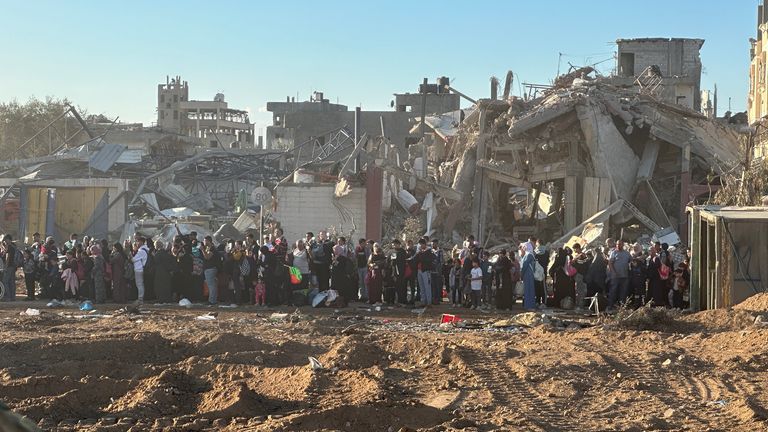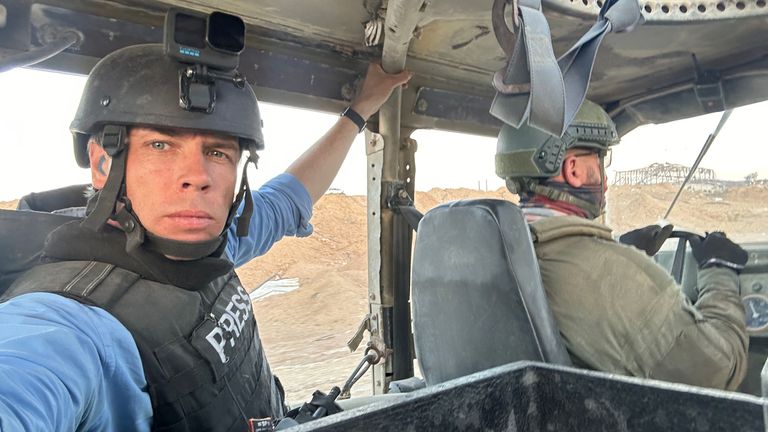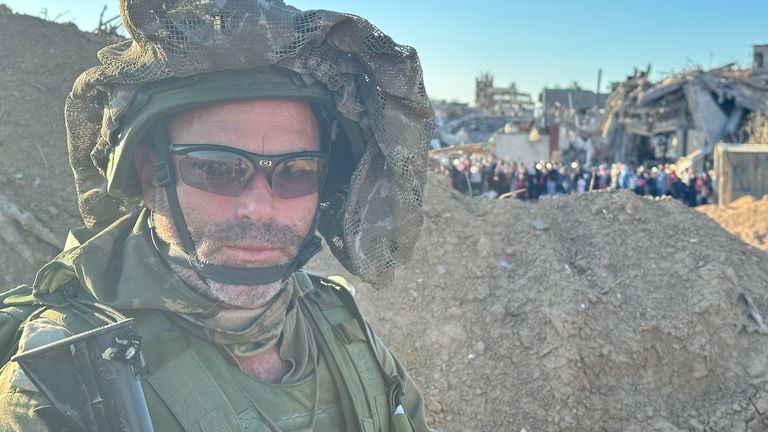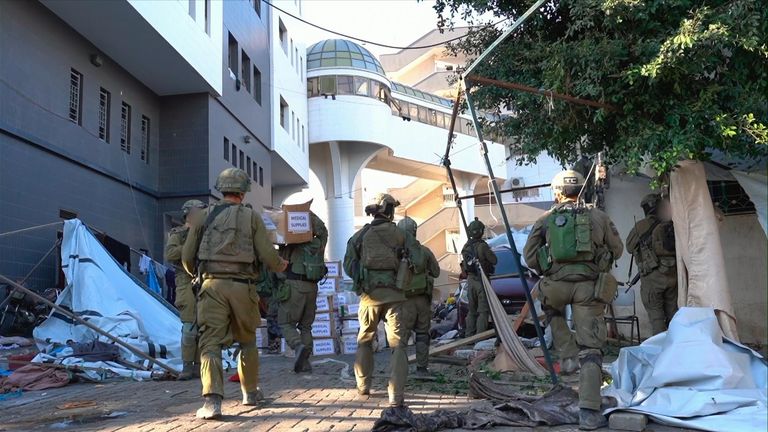
To see the column of people up close was quite something.
Several hundred Palestinians, young and elderly, in a thin line facing south on the main north-south road that cuts down through Gaza.
On a loudhailer, an Israeli soldier is issuing instructions in Arabic. They should move south, they are told, and they will be safe.
We’re deep inside Gaza, a couple of miles southeast of Gaza City itself.
Israel-Gaza latest: UN issues dire warning
Behind us, a couple of miles back, to the east, is the border fence with Israel.
The land between us and the fence resembles a wasteland. What were once fields are now a vast area of earth, churned up by the Israeli military vehicles, which are shuttling back and forth.
Ahead of us, looking west, it’s a different sort of wasteland. Not a single building is untouched. Some are barely standing. In the distance, there is the occasional boom.
We’re with the Israeli military on an embedded facility. The purpose, from the Israeli perspective, is to show us what the humanitarian corridors they have been under so much pressure to implement actually look like.
For us, despite the restrictions they have imposed (we cannot film certain soldiers’ faces, screens in vehicles, identifiable landscape or certain equipment), it’s a chance to see first-hand what’s happening inside this tiny part of Gaza they are willing to show us.
There is no other way to enter Gaza at the moment. It’s with the Israeli military or not at all.
The reporting is subject to Israeli military restrictions.
Our ride in was in a battered and dusty Humvee. We passed through the same part of the border fence through which Hamas fighters came, the other way, on 7 October.
We were about to see what Israel’s five-week long response to that massacre looks like up close.
It’s about a 15-minute drive from the border fence to the edge of Gaza City.
To the north, we could see the black smoke rising from the latest airstrikes.
Just ahead I caught a glimpse of the Mediterranean Sea beyond the rubble of the southern outskirts of Gaza City.
At first, I didn’t notice the hundreds of Palestinians. They were obscured behind a berm of earth. My eye was drawn to the battered buildings beyond.
But then they came into view. Honestly, it resembled a scene from another time.
It’s being presented as good news: people being guided out of a warzone, through a temporary pause in fighting, to safety in the south of Gaza.
“We’re protecting it day and night, in the rain and the sun, and making sure that all these civilians that aren’t involved in terror, could leave the area, and let us get our job done,” a major, who we could only identify as Shraga, told me.
“Our job, our main objective, is to totally eliminate Hamas. We won’t want to hurt any of these civilians. And that’s why we’re letting them go out.”
‘An echo of their history’
Seeing these people move south, out of the warzone a few miles to the north, is clearly good for their safety.
But to view it simply in those terms is to miss the point.
From the perspective of the Palestinians, this is an echo of their history. They see it as forced displacement from homes which have been destroyed and to which they never think they will return.
Many Gazans are from families already displaced two generations earlier.
I asked the major if he could see this from the Palestinian perspective; the impact on their psyche – they feel like they’re being moved out of their homes, and that they will never be able to go back?
“After what I saw on October 7, I failed to understand the Palestinian psyche,” the major said.
“So I don’t know how they’re looking at it, or what they understand.
“I don’t know if you visited our kibbutzim that were raided, and how Hamas brought hell into our homes. So the responsibility on that is on them.
“We are here not to fight not because we love fighting, not because we’re bloodthirsty, and not because we hate any Palestinians. We are here fighting, because we want to live peaceful, productive lives on the other side of the border.”
I asked: “And to those who say that in eliminating evil, you are reaping misery on two million people. What do you say?”
Major Shraga replied: “They’re welcome to take that question straight back to Hamas. You can see here with your own eyes, how much effort we’re putting in to let innocent civilians out.”
“And the civilian casualties?” I asked. “11,000 people dead, killed in four weeks.”
The major said: “Yeah, well, those are big numbers. But when we judge, then it’s not about the numbers. It’s about eliminating evil. And we saw what Hamas could do, what Hamas intends to do.”
It was deeply frustrating not to be able to talk to the people in front of us.
The Israeli military cited security concerns. Hamas snipers, they told us, were emerging from tunnels. And others could be among the civilians being moved south.
So we couldn’t get the reflections of the people here. It’s only when they reach the south that they are able to speak as many have about the pain of being forced from homes destroyed.
And even in the south, they are not safe.
I asked the officer permitted to speak about this: how was it right to destroy peoples’ homes then force them south to areas also being targeted?
The officer replied: “Honestly, I don’t know. I do know that war is not safe. I do know that we are doing everything we can to hit directly the terrorist, not civilians. Honestly, I haven’t been in the south so I cannot answer that question.”
Read more:
Village caught in crossfire ‘could turn into battlefield’
Israel claims al Shifa hospital has a dark side
Footage shows soldier toss grenades back at Hamas
Click to subscribe to the Sky News Daily wherever you get your podcasts
I asked the same officer about the accusations of war crimes. The question was cut short.
An Israeli spokesperson, accompanying us, took the question a little later.
“Israel is not guilty of any war crimes,” Major Doron Spielman told me.
“I’ve also heard from many international lawyers. This was an assault that was inflicted on Israel.
“Every nation, including Israel, including England, including the United States – all over the world – if there’s a massacre that’s committed on your border and an active threat, you have no choice but to destroy that enemy.”
He added: “That is not only international law, that is also the law of morality.”
What about the number of Gazans killed in a little over four weeks?
“I think that the fact remains that Hamas is operating within that civilian population…” Major Speilman said.
But, I asked, can that be an excuse for killing so many civilians in just a few weeks?
He replied: “I think that again, that every one of these civilians that has unfortunately died, is because Hamas is using them to cover up their operations. Hamas is actively, to this day while speaking to you, shooting rockets, even in this humanitarian corridor.”
So the deaths are inevitable, I asked, and worth it to eliminate Hamas?
“Death is a horrific outcome of war,” Major Speilman said.















